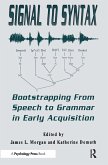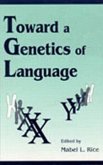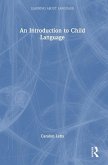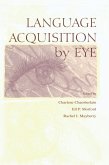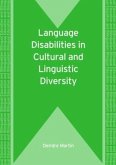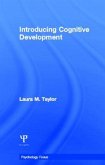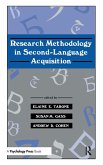Talking to Adults
The Contribution of Multiparty Discourse to Language Acquisition
Herausgeber: Blum-Kulka, Shoshana; Snow, Catherine E
Talking to Adults
The Contribution of Multiparty Discourse to Language Acquisition
Herausgeber: Blum-Kulka, Shoshana; Snow, Catherine E
- Gebundenes Buch
- Merkliste
- Auf die Merkliste
- Bewerten Bewerten
- Teilen
- Produkt teilen
- Produkterinnerung
- Produkterinnerung
The focus of this volume is on how language is used between adults and children. The results is a volume that will appeal to readers in language development and narrative discourse. Has the potential to become a classic graduate-level text/reference.
Andere Kunden interessierten sich auch für
![Signal to Syntax Signal to Syntax]() Signal to Syntax173,99 €
Signal to Syntax173,99 €![Toward a Genetics of Language Toward a Genetics of Language]() Toward a Genetics of Language115,99 €
Toward a Genetics of Language115,99 €![An Introduction to Child Language An Introduction to Child Language]() Carolyn LettsAn Introduction to Child Language181,99 €
Carolyn LettsAn Introduction to Child Language181,99 €![Language Acquisition by Eye Language Acquisition by Eye]() Language Acquisition by Eye181,99 €
Language Acquisition by Eye181,99 €![Language Disabilities in Cultural and Linguistic Diversity Language Disabilities in Cultural and Linguistic Diversity]() Deirdre MartinLanguage Disabilities in Cultural and Linguistic Diversity150,99 €
Deirdre MartinLanguage Disabilities in Cultural and Linguistic Diversity150,99 €![Introducing Cognitive Development Introducing Cognitive Development]() Laura TaylorIntroducing Cognitive Development170,99 €
Laura TaylorIntroducing Cognitive Development170,99 €![Research Methodology in Second-Language Acquisition Research Methodology in Second-Language Acquisition]() Research Methodology in Second-Language Acquisition110,99 €
Research Methodology in Second-Language Acquisition110,99 €-
-
-
The focus of this volume is on how language is used between adults and children. The results is a volume that will appeal to readers in language development and narrative discourse. Has the potential to become a classic graduate-level text/reference.
Produktdetails
- Produktdetails
- Verlag: Taylor & Francis Ltd (Sales)
- Seitenzahl: 360
- Erscheinungstermin: 1. April 2002
- Englisch
- Abmessung: 229mm x 152mm x 21mm
- Gewicht: 649g
- ISBN-13: 9780805836608
- ISBN-10: 0805836608
- Artikelnr.: 25469899
- Herstellerkennzeichnung
- Libri GmbH
- Europaallee 1
- 36244 Bad Hersfeld
- gpsr@libri.de
- Verlag: Taylor & Francis Ltd (Sales)
- Seitenzahl: 360
- Erscheinungstermin: 1. April 2002
- Englisch
- Abmessung: 229mm x 152mm x 21mm
- Gewicht: 649g
- ISBN-13: 9780805836608
- ISBN-10: 0805836608
- Artikelnr.: 25469899
- Herstellerkennzeichnung
- Libri GmbH
- Europaallee 1
- 36244 Bad Hersfeld
- gpsr@libri.de
Shoshana Blum-Kulka, Catherine E. Snow
Contents: Editors' Introduction. Part I: Issues in the Development of
Extended Discourse: Narratives and Explanations.D.E. Beals, C.E. Snow,
Deciding What to Tell: Selecting and Elaborating Narrative Topics in Family
Interaction and Children's Elicited Personal Experience Stories. A.
Georgakopoulou, Greek Children and Familiar Narratives in Family Contexts:
En Route to Cultural Performances. V.G. Aukrust, "What Did You Do in School
Today?" Speech Genres and Tellability in Multiparty Family Mealtime
Conversations in Two Cultures. S. Blum-Kulka, "Do You Believe That Lot's
Wife Is Blocking the Road (to Jericho)?" Co-Constructing Theories About the
World With Adults. A. Nicopoulou, Peer-Group Culture and Narrative
Development. Part II: The Language of Affect and Humor: Pragmatic
Developmental Perspectives.C. Hérot, Socialization of Affect During
Mealtime Interactions. R. Nevat-Gal, Cognitive Expressions and Humorous
Phrases in Family Discourse as Reflectors and Cultivators of Cognition. A.
Fasulo, V. Liberati, C. Pontecorvo, Language Games in the Strict Sense of
the Term: Children's Poetics and Conversation. Part III: Issues of Context
and Culture in Pragmatic Development.P. Brown, Everyone Has to Lie in
Tzeltal. K. Aronsson, M. Thorell, Voice and Collusion in Adult-Child Talk:
Toward an Architecture of Intersubjectivity. H. Kasuya, Bilingual Context
for Language Development. C.E. Snow, S. Blum-Kulka, From Home to School:
School-Age Children Talking With Adults.
Extended Discourse: Narratives and Explanations.D.E. Beals, C.E. Snow,
Deciding What to Tell: Selecting and Elaborating Narrative Topics in Family
Interaction and Children's Elicited Personal Experience Stories. A.
Georgakopoulou, Greek Children and Familiar Narratives in Family Contexts:
En Route to Cultural Performances. V.G. Aukrust, "What Did You Do in School
Today?" Speech Genres and Tellability in Multiparty Family Mealtime
Conversations in Two Cultures. S. Blum-Kulka, "Do You Believe That Lot's
Wife Is Blocking the Road (to Jericho)?" Co-Constructing Theories About the
World With Adults. A. Nicopoulou, Peer-Group Culture and Narrative
Development. Part II: The Language of Affect and Humor: Pragmatic
Developmental Perspectives.C. Hérot, Socialization of Affect During
Mealtime Interactions. R. Nevat-Gal, Cognitive Expressions and Humorous
Phrases in Family Discourse as Reflectors and Cultivators of Cognition. A.
Fasulo, V. Liberati, C. Pontecorvo, Language Games in the Strict Sense of
the Term: Children's Poetics and Conversation. Part III: Issues of Context
and Culture in Pragmatic Development.P. Brown, Everyone Has to Lie in
Tzeltal. K. Aronsson, M. Thorell, Voice and Collusion in Adult-Child Talk:
Toward an Architecture of Intersubjectivity. H. Kasuya, Bilingual Context
for Language Development. C.E. Snow, S. Blum-Kulka, From Home to School:
School-Age Children Talking With Adults.
Contents: Editors' Introduction. Part I: Issues in the Development of
Extended Discourse: Narratives and Explanations.D.E. Beals, C.E. Snow,
Deciding What to Tell: Selecting and Elaborating Narrative Topics in Family
Interaction and Children's Elicited Personal Experience Stories. A.
Georgakopoulou, Greek Children and Familiar Narratives in Family Contexts:
En Route to Cultural Performances. V.G. Aukrust, "What Did You Do in School
Today?" Speech Genres and Tellability in Multiparty Family Mealtime
Conversations in Two Cultures. S. Blum-Kulka, "Do You Believe That Lot's
Wife Is Blocking the Road (to Jericho)?" Co-Constructing Theories About the
World With Adults. A. Nicopoulou, Peer-Group Culture and Narrative
Development. Part II: The Language of Affect and Humor: Pragmatic
Developmental Perspectives.C. Hérot, Socialization of Affect During
Mealtime Interactions. R. Nevat-Gal, Cognitive Expressions and Humorous
Phrases in Family Discourse as Reflectors and Cultivators of Cognition. A.
Fasulo, V. Liberati, C. Pontecorvo, Language Games in the Strict Sense of
the Term: Children's Poetics and Conversation. Part III: Issues of Context
and Culture in Pragmatic Development.P. Brown, Everyone Has to Lie in
Tzeltal. K. Aronsson, M. Thorell, Voice and Collusion in Adult-Child Talk:
Toward an Architecture of Intersubjectivity. H. Kasuya, Bilingual Context
for Language Development. C.E. Snow, S. Blum-Kulka, From Home to School:
School-Age Children Talking With Adults.
Extended Discourse: Narratives and Explanations.D.E. Beals, C.E. Snow,
Deciding What to Tell: Selecting and Elaborating Narrative Topics in Family
Interaction and Children's Elicited Personal Experience Stories. A.
Georgakopoulou, Greek Children and Familiar Narratives in Family Contexts:
En Route to Cultural Performances. V.G. Aukrust, "What Did You Do in School
Today?" Speech Genres and Tellability in Multiparty Family Mealtime
Conversations in Two Cultures. S. Blum-Kulka, "Do You Believe That Lot's
Wife Is Blocking the Road (to Jericho)?" Co-Constructing Theories About the
World With Adults. A. Nicopoulou, Peer-Group Culture and Narrative
Development. Part II: The Language of Affect and Humor: Pragmatic
Developmental Perspectives.C. Hérot, Socialization of Affect During
Mealtime Interactions. R. Nevat-Gal, Cognitive Expressions and Humorous
Phrases in Family Discourse as Reflectors and Cultivators of Cognition. A.
Fasulo, V. Liberati, C. Pontecorvo, Language Games in the Strict Sense of
the Term: Children's Poetics and Conversation. Part III: Issues of Context
and Culture in Pragmatic Development.P. Brown, Everyone Has to Lie in
Tzeltal. K. Aronsson, M. Thorell, Voice and Collusion in Adult-Child Talk:
Toward an Architecture of Intersubjectivity. H. Kasuya, Bilingual Context
for Language Development. C.E. Snow, S. Blum-Kulka, From Home to School:
School-Age Children Talking With Adults.


